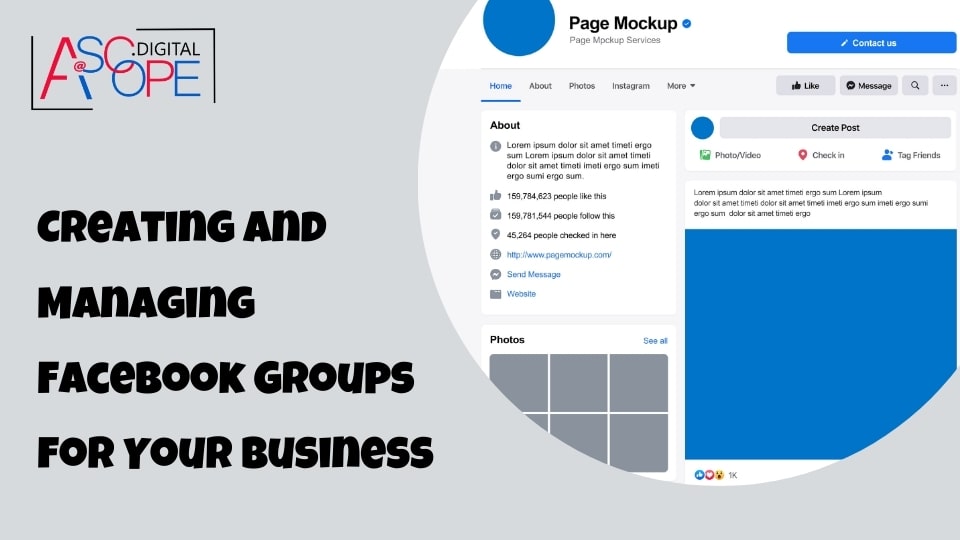Facebook Groups have emerged as a powerful tool for businesses seeking to build and engage with their community. These groups offer a platform where businesses can connect with their audience on a more personal level, foster discussions, and create a sense of belonging among members. In this article, we will explore the steps involved in creating and managing a Facebook Group for your business, the benefits of having a group, and strategies to keep it active and engaging.
Why Facebook Groups?

Facebook Groups provide a unique opportunity to build a community around your brand. Unlike Facebook Pages, which primarily serve as a one-way communication channel, groups facilitate two-way interactions, allowing members to share their thoughts, ask questions, and engage with each other. This sense of community can lead to increased brand loyalty, higher engagement rates, and valuable insights into your customers’ needs and preferences.
Setting Up Your Facebook Group
Define Your Purpose
Before creating a Facebook Group, it’s essential to define its purpose. What do you hope to achieve with the group? Whether it’s to provide customer support, share exclusive content, gather feedback, or create a space for like-minded individuals to connect, having a clear purpose will guide your group’s activities and help attract the right members.
Choose the Right Type of Group
Facebook offers three types of groups: Public, Closed, and Secret. A Public group is visible to anyone, and anyone can join without approval. A Closed group is visible to everyone, but new members need to be approved by an admin. A Secret group is not visible in search results, and new members can only join if invited. Choose the type that aligns with your group’s purpose and desired level of privacy.
Create the Group
To create your group, go to the “Groups” section on Facebook and click on “Create Group.” Fill in the necessary details such as the group name, privacy settings, and members to invite. Choose a name that reflects the group’s purpose and is easy to find in search results.
Set Up Group Rules
Establishing clear group rules is crucial for maintaining a positive and respectful environment. Outline what is acceptable and what isn’t, and make sure to enforce these rules consistently. Common rules include no spam, respect others’ opinions, and stay on topic.
Building Your Community

Promote Your Group
Once your group is set up, promote it through your existing channels. Share the group link on your Facebook Page, website, email newsletters, and other social media platforms. Encourage your current followers and customers to join and invite their friends.
Engage New Members
First impressions matter, so welcome new members with a friendly message and encourage them to introduce themselves. This helps new members feel valued and sets the tone for an engaging community. You can also create a pinned post with important information about the group, including its purpose, rules, and any ongoing activities or events.
Provide Value
To keep members engaged, regularly share valuable content that aligns with your group’s purpose. This can include industry news, tips and tutorials, behind-the-scenes looks at your business, and exclusive offers. Encourage members to share their own content and participate in discussions.
Managing Your Group
Monitor and Moderate
Active moderation is key to maintaining a healthy group environment. Monitor posts and comments regularly to ensure they adhere to the group rules. Address any issues promptly, whether it’s removing spam, handling conflicts, or answering questions.
Foster Engagement
Create opportunities for engagement by hosting Q&A sessions, polls, and live events. Ask open-ended questions to spark discussions and encourage members to share their experiences and opinions. Recognize and appreciate active members to encourage continued participation.
Analyze and Adapt
Use Facebook’s group insights to track engagement metrics such as active members, posts, comments, and reactions. Analyze this data to understand what’s working and what isn’t, and adjust your strategies accordingly. Regularly solicit feedback from members to ensure the group continues to meet their needs.
Leveraging Facebook Groups for Business Growth

Build Relationships
One of the biggest advantages of Facebook Groups is the ability to build deeper relationships with your customers. By engaging with members on a personal level, you can build trust and loyalty. Listen to their feedback, answer their questions, and show genuine interest in their concerns.
Gather Insights
Your Facebook Group can serve as a valuable source of insights into your customers’ preferences and pain points. Pay attention to recurring themes in discussions and use this information to improve your products, services, and marketing strategies. Conduct surveys and polls to gather more structured feedback.
Drive Traffic and Sales
Leverage your group to drive traffic to your website and increase sales. Share links to your blog posts, product pages, and special offers. However, be mindful not to overwhelm members with promotional content. Balance promotional posts with valuable and engaging content to keep the group vibrant and active.
Best Practices for Facebook Group Management
Be Consistent
Consistency is crucial for keeping your group active and engaged. Set a regular posting schedule and stick to it. Whether it’s daily, weekly, or bi-weekly, consistent activity helps keep the group dynamic and encourages members to check in regularly.
Encourage User-Generated Content
Encourage members to share their own content, whether it’s their experiences, tips, or questions. User-generated content not only increases engagement but also provides valuable insights and perspectives. Recognize and appreciate contributions to foster a sense of community.
Collaborate with Influencers
Partnering with influencers can help boost your group’s visibility and credibility. Identify influencers within your industry who align with your brand values and invite them to join and contribute to the group. Their participation can attract more members and spark interesting discussions.
Handle Conflicts Gracefully
Conflicts and disagreements are inevitable in any community. When they arise, address them promptly and gracefully. Enforce group rules consistently and fairly, and mediate conflicts to maintain a positive environment. Encourage respectful and constructive discussions.
Celebrate Milestones
Celebrate group milestones such as member count milestones, anniversaries, or special achievements. Acknowledge and appreciate your members’ contributions and participation. This not only boosts morale but also reinforces the sense of community.
Common Challenges and Solutions
Dealing with Inactivity
Inactivity can be a common challenge in Facebook Groups. To combat this, plan regular activities and events to keep members engaged. Use polls and surveys to understand what type of content members find most valuable and adjust your strategy accordingly.
Managing Spam
Spam can quickly degrade the quality of your group. Implement strict rules against spam and have a moderation team in place to enforce these rules. Use Facebook’s group settings to approve posts and comments if necessary to prevent spam from reaching the group.
Balancing Promotion and Value
While it’s important to use your group to promote your business, it’s equally important to provide value to your members. Strive for a balance between promotional content and engaging, valuable content. Listen to your members’ feedback and adjust your content strategy to meet their needs.
Advanced Strategies for Group Growth
Host Exclusive Events
Hosting exclusive events for group members can drive engagement and attract new members. This can include webinars, live Q&A sessions, virtual meetups, or special giveaways. Promote these events through your other marketing channels to maximize participation.
Create Sub-Groups
If your main group grows significantly, consider creating sub-groups for specific topics or segments of your audience. This allows for more focused discussions and can help manage the group more effectively. Ensure that each sub-group has clear guidelines and is actively moderated.
Leverage Facebook Features
Facebook continuously updates its features for groups. Stay informed about these updates and leverage new features to enhance your group. This can include utilizing the units feature for structured learning, setting up mentorship programs, or using the insights tool to track and analyze engagement.
Maximizing Engagement and Growth
Creating and managing a Facebook group for your business can significantly boost engagement and foster a loyal community. To maximize the benefits, focus on regularly posting valuable content that resonates with your audience. This includes sharing industry news, answering questions, and encouraging discussions. Engaging with your members through polls, live videos, and Q&A sessions helps build stronger relationships and trust.
Moreover, leveraging group insights allows you to understand your audience’s preferences and tailor your content accordingly. This strategic approach not only enhances member engagement but also drives them to your website. By integrating your Facebook group with your overall marketing strategy, you can create a seamless customer journey, leading to higher conversion rates. Thus, improving traffic and sales for your website. Read more on the other reasons why your website isn’t getting traffic to ensure you are addressing all potential issues
Conclusion
Creating and managing a Facebook Group for your business can be a powerful way to build a loyal community, gather valuable insights, and drive growth. By defining a clear purpose, engaging members with valuable content, and consistently managing and moderating the group, you can create a vibrant and active community around your brand. Embrace the challenges and continuously adapt your strategies to meet the evolving needs of your members. With dedication and effort, your Facebook Group can become a cornerstone of your social media marketing strategy.
Remember that building a community takes time and patience. Be genuine in your interactions, listen to your members, and continually seek ways to add value to the group. The relationships and loyalty you build through your Facebook Group can have a lasting positive impact on your business. So, take the first step today, create your group, and start building a community that will support and grow with your business


